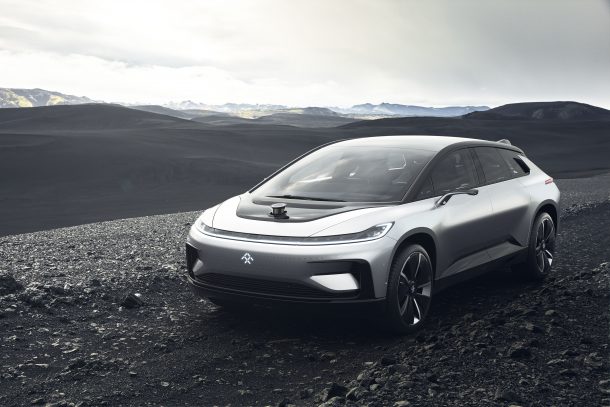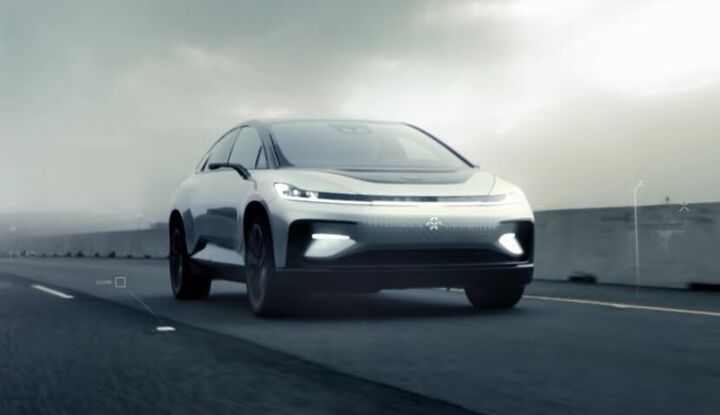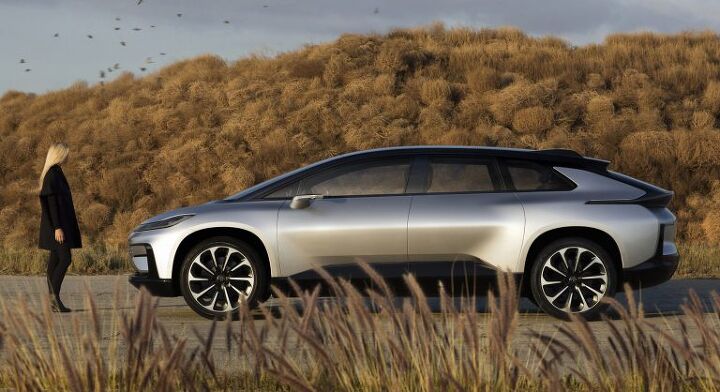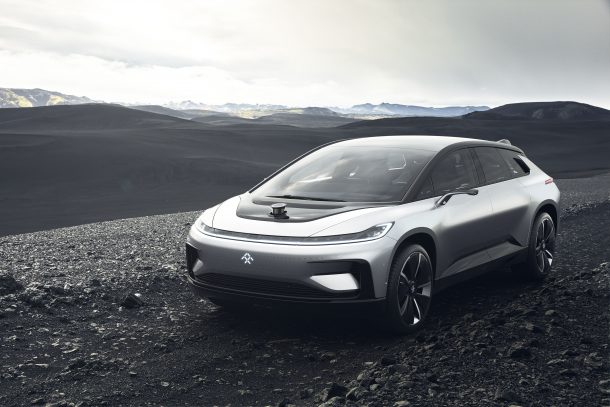#ff
SEC Subpoenas Faraday Future Executives
Several executives from perpetual automotive startup Faraday Future have reportedly been subpoenaed by the U.S. Securities and Exchange Commission as part of an investigation into inaccurate statements made to investors. Though, considering the nameplate’s history, it would be impossible to assume which item the SEC will be focusing on thanks to FF’s exceptionally long history of industrial misgivings.
We’ve covered Faraday Future’s long and bizarre story from the early days of delivering half-baked, though otherwise impressive, concepts to its more recent status as an automaker in the ethereal sense. It’s promised the moon and only managed to deliver a handful of production husks that never surpassed the body-in-white phase and some “production-intent” prototypes of the FF91. Though the larger story is the SEC’s sudden interest in electric vehicle startups that went public via mergers with blank check firms, better known as special purpose acquisition companies (SPACs), over the last two years.
Faraday Future Amazingly Still Active
Faraday Future hasn’t been making many headlines of late. But it remains an active business entity, surprisingly enough. On Thursday, it announced it had selected Velodyne Lidar Inc. as the exclusive supplier for the sensing/mapping hardware that’s going into its flagship FF91 EV.
Faraday’s missteps have been so frequent and gargantuan, that it would be impossible to give the abridged history without still wasting a large portion of your day. We’ll spare you from that and allow interested parties to dig through older articles about factory snafus, secret management structures, faked prototypes, development setbacks, bankruptcy, and more. The only thing you need to remember is that it is genuinely miraculous that FF still exists as a company – almost like it’s a testament to the utter ridiculousness of some tech startups – that continues to believe it will someday manufacture an electric car.
Faraday Future Returns, Discusses Going Public With Reverse Merger
Faraday Future is hoping to go public through a reverse merger, proving that the finances associated with electric vehicle startups rarely operate within the confines of reality. Founded by Chinese businessman Jia Yueting in April 2014, the company began making waves the following year when it announced a plan to invest over $1 billion a factory in Nevada (its first) and went on a massive hiring spree. With the help of millions in government tax incentives, the plan was to start building some of the world’s most advanced EVs by 2017.
But people were becoming suspicious as early as 2016, when questions were raised about where the money was coming from and how much was left. By year’s end, work on Faraday’s Nevada facility had been suspended indefinitely. Following a lightly-botched presentation of its future product in early 2017, more outlets began to report the company was quickly running out of money as it backed out of several more projects. Months later, an internal power struggle left founder Jia Yueting as the primary decision-maker. Faraday Future spent the next few years scrambling to repay its debts and scrounging for (mostly Chinese) investors that might get it closer to its ultimate goal of building cars.
Faraday Future Founder Files for Chapter 11
The founder of Faraday Future, Yueting Jia, has filed for bankruptcy and restructuring under Chapter 11 in the United States, according to a statement released by the company. The decision allows Jia (known within the company as “YT”) to address his debts in China, which can be measured billions, so his ownership of FF can be transferred to creditors.
Due to Faraday’s repeatedly broken promises and clandestine way of doing business, we’ve never had an overabundance of faith in the company. While that view hasn’t changed, the corporate statement frames Jia’s U.S. bankruptcy as a positive.
Yet Another Bailout for Faraday Future
Faraday Future, the contentious automotive startup that always seems to find (and then lose) sizable amounts of cash, has announced it has once again managed to secure new funding. According to its press release, Faraday says will receive $225 million in bridge financing via a funding round led by Birch Lake Associates.
While the bulk of the cash will go towards paying off vendors, some of which have filed lawsuits, around 40 percent will be left over to help get the FF91 to market and prove the company can actually build a car. The strategy seems risky, but it may be Faraday’s best bet at this point.
Faraday Future Teases Ultra-modern Minivan
Faraday Future is my favorite automaker and it’s not because they build the best cars. With the exception of a few prototypes of the FF91, Faraday hasn’t really built much of anything. But I’ve become enamored with the story of a mysterious automotive company, funded by a controversial Chinese backer, that continues to defy the odds by just surviving — despite a long history of ridiculous mistakes, financial shortfalls, and missed production targets. For me, its been a suitable substitute for soap operas.
The last time we checked in on Faraday, it had just broken ties with its savior-turned-destructor Evergrande. The company announced in January that it had agreed to restructure its $2 billion investment in FF and that both parties had acquiesced to drop all litigation against each other. Now Faraday is back with a new joint partnership and a new model — a minivan straight out of a late 20th century sci-fi flick.
Faraday Future Getting Back Into the Game With New Chinese Partner
With Faraday Future and Evergrande Health having officially settled their bitter legal dispute late last year, the once-again independent automaker could finally get back to hunting for new investors. Despite Faraday’s entire existence being overshadowed by financial missteps and bizarre business dealings (resulting in an inability to deliver product), it’s extremely good at scrounging up funds. Breaking ties with its primary financial partner might have seemed like bad news, especially after so many near-death experiences, but this is where the company shines the brightest.
On Sunday, Faraday Future signed into a 50-50 partnership with Shanghai-based internet gaming operator The9 — which amassed its fortune after gaining exclusive licensing rights to operate and distribute the extremely popular World of Warcraft in China. Faraday said the deal marks the first step in its plan to officially launch its dual-home-market strategy in both China and the United States.
Faraday Future Wraps Up Dispute With Main Investor Without Incident - What Now?
Faraday Future, the Chino-American EV developer that’s always in dutch, said Monday it has established and signed a new restructuring agreement with its main investor, Evergrande Health Industry Group Ltd. The deal concludes a rather ugly legal dispute between the two — one which placed Faraday’s intellectual property and finances in serious jeopardy.
Following the departure of co-founder Nick Sampson in November, the automaker found itself seeking new financing opportunities. Evergrande, which purchased a majority take in the EV firm via its summer acquisition of Season Smart, attempted to block new investments while Faraday accused the company of attempting a forcible takeover of the automaker by withholding funds earmarked for outstanding debts. Those funds were essential in helping it reach agreed-upon production targets.
You Can Now Legally Invest In Faraday Future…
Faraday Future’s path to glory has been complicated to say the least. A series of ludicrously ambitious moves have been plighted with failure, followed by renewed hopes that were ultimately dashed. Incredibly, the aspiring automaker still exists and intends to begin production of its first electric vehicle once its money troubles are over.
Unfortunately, the company is currently engaged in a bitter legal battle with its biggest investor, China’s Evergrande Group, after a planned $2 billion investment went south. The reasons as to why are as foggy as the memory of a heavy drinker but Faraday wanted to trudge onward anyway. Initially, that seemed impossible — especially considering Evergrande held the ability to block any additional investments into the company. However, an interim ruling by a Hong Kong arbitration court has granted Faraday relief to seek financing without approval.
Faraday Future Co-founder Calls It Quits; Majority Shareholder Has Odd Debt Solution
Faraday Future co-founder Nick Sampson has quit his executive post as the aspiring automaker continues struggling with finance issues relating to its latest financial backer and China’s second-largest real estate developer, Evergrande Group.
That leaves CEO Jia Yueting as the company’s only founding executive left on staff. But it would appear he might also leave, albeit under duress, if Faraday’s largest shareholder gets its way. While it’s not obvious exactly who shot first, the electric vehicle firm and Evergrande are at each other’s throats — ruining a $2 billion deal that was supposed to save the company and get its ambitious debut model, the FF 91, into production. Apparently, it was all too much for Sampson.
Faraday Future Confronting Layoffs, Pay Cuts, Probable Corporate Doom
Following a previous article about Faraday Future, the manufacturer reached out to yours truly to clarify a few things. First of all, the company deemed the headline and body a bit “jagged.” Understandable, as no manufacturer wants to be called “America’s Worst Automaker” by some bespectacled creep sitting behind a keyboard. Faraday’s spokesperson also noted that deliveries would not begin in December and that the vehicle fire we referenced was a “minor incident” involving a pre-production model undergoing testing at the firm’s Hanford manufacturing facility.
Actually, that makes things sound a little worse than initially reported, as it appears the company doesn’t have a production date anymore. But I will acquiesce that I could have been clearer with that’s going on with its new financial backer, Evergrande. The pair have been at each other’s throats over money for a while, which is important because the spat is now costing people their jobs. We really need to get into the nitty gritty as to why.
Checking In With Faraday Future, America's Worst Automaker
Faraday Future’s summer fling with Chinese real estate group Evergrande, which invested $800 million into the company last June, appears to be over. The “automaker” is allegedly trying to back out of its arrangement after its CEO and founder, Jia Yueting, requested an additional $700 million in funding. The official deal calls for another $1.2 billion over the next two years.
Faraday has a real knack for screwing over anyone who lends it any kind of financial help, and it looks like its biggest investor doesn’t want to get burned. As a result, the carmaker wants out and Jia has begun seeking arbitration to abandon the sale.
So far as we know, Evergrande stipulated that the company had to hand over its intellectual property and begin mass production of the FF91 before year’s end — otherwise Jia will be ousted as CEO. Officially, Faraday says it’s on track for December deliveries, but all we’ve actually seen are a few side panels being passed around by robots and one completed shell. Meanwhile, the manufacturer’s only completed pre-production prototype was reported to have caught fire last month, following an event where it was shown to employees and their families.
Faraday Future Sets up Headquarters in China, Promises New Models and 5 Million Cars By 2028
Evergrande Health Industry Group Ltd, which owns a 45 percent stake in U.S.-based Faraday Future, said Tuesday that the electric vehicle startup has officially moved its headquarters to China. The group claims Faraday now plans on building five R&D and production facilities across the country over the next decade.
The intended goal is to have the startup reach an annual production capacity of 5 million vehicles within 10 years and launch multiple “premium to entry-level segments for the global auto market, to build an internet-based intelligent mobility ecosystem,” Evergrande said.
It sounds a little premature for a company that managed to evade certain death by the skin of its teeth — and only just snagged a manufacturing facility — a few months ago.
Faraday Future CEO Defies Order to Return to China
Founder of the debt-laden technology firm LeEco has shirked orders from Chinese authorities to return to the country before the end of 2017, saying he needed to stay within the United States to fundraise for Faraday Future. Last week, the Beijing branch of the China Securities Regulatory Commission issued a notice ordering Jia Yueting to return to China to face the staggering debt attached to his various businesses and protect investors’ rights.
However, he claims he’s making too much headway with efforts to keep electric vehicle startup Faraday Future from sinking deeper into the toilet to head back to China. Instead, he has requested that his brother, Jia Yuemin, meet the regulator face-to-face last Friday to provide a report in response to the notice.
Faraday Future Claims It Rustled Up $1 Billion in Funding and a New CEO
Faraday Future is the real-life equivalent of a franchised movie monster. While not a physical manifestation of evil, destined to rip apart promiscuous teens in increasingly elaborate ways, it does possess the unique ability to keep coming back every time you thought it had finally been destroyed.
Despite having lost a factory in Nevada, a chief financial officer, chief technology officer, lead designer, head of manufacturing, Formula E team, and the public’s trust (you can add bankruptcy rumors to the mix, too), LeEco chairman Jia Yueting now claims the company has suddenly managed to raise $1 billion in funding.
Jason Voorhees, eat your heart out.





























Recent Comments